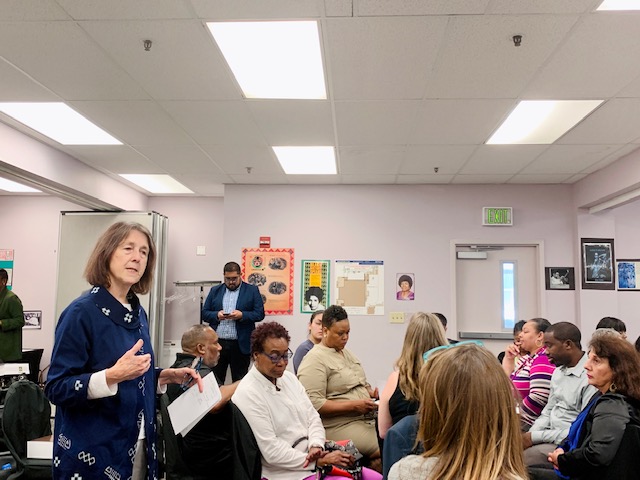By Jesus Mata, Policy & Grassroots Coordinator, LeadingAge California
This week, Humangood’s Ancel Romero, President of Affordable Housing, moderated the second Homeward Bound Work Session: Seeking Solutions to Elder Homeless. The discussion took place at Allen Temple Baptist Church in Oakland, taking into account the prevalence of homelessness in the Bay Area and Northern California. A diverse range of attendees with knowledge of and service to the older adult homeless population in the area were in participation, including leaders from various non-profit and governmental organizations such as the Non-Profit Housing Association of Northern California, City of Oakland, LifeSTEPS, EveryOne Home, Christian Church Homes, Alameda Point Collaborative and many more.

Senator Skinner (D-Oakland) addresses the group
Research by colleague Margot Kushel, MD, a professor of medicine at UCSF, was presented to inform the group’s discussion. Dr. Kushel has a “particular interest in homelessness in older adults and homelessness in medically complicated individuals. She is the Principal Investigator to the HOPE HOME (Health Outcomes in Populations Experiencing Homelessness in Older Middle agE) cohort, an ongoing longitudinal cohort study examining the causes and effects of homelessness on adults aged 50 and over in Oakland, CA,” according to her UCSF profile. This impactful study follows over 350 homeless seniors for a total of 10 years, and shows that the average age of people experiencing homelessness has shifted in the Bay Area; about half of the people over the age of 50 who were homeless in Alameda County had never experienced homelessness until they reached that age range. In Sacramento County, another data set shows that 1 in 5 homeless people are 55 or older, with the trend expected to continue as California’s senior population grows.
These sobering findings formed the context for the group’s discussion on how to shift housing and homeless policies in order to attend to both people who have been on the streets for a long time and those who are newly experiencing homelessness. Our diverse group contributed to the discussion on various questions, one being: what potential opportunities and collaborations can be created to serve homeless seniors who have progressive illnesses? This fruitful dialogue brought forth many recommendations and strategies. One was to personalize the issue in communities across the state to address NIMBY concerns, emphasizing that addressing homelessness requires local action in all of our cities. Another suggestion was to better leverage the sources of healthcare funding to tackle this issue. As this work group demonstrated, it is invaluable to come together with organizations from all over the state to bring our experiences into one shared conversation.

